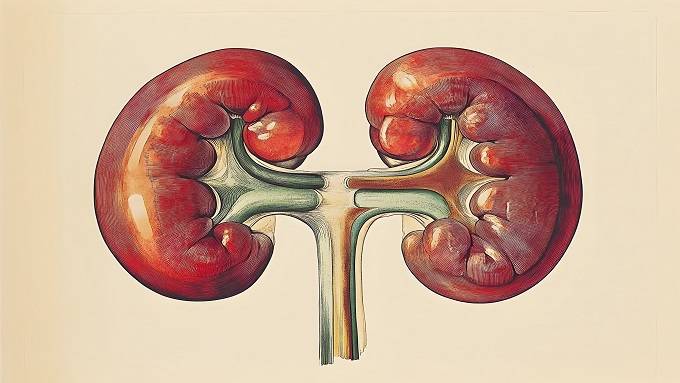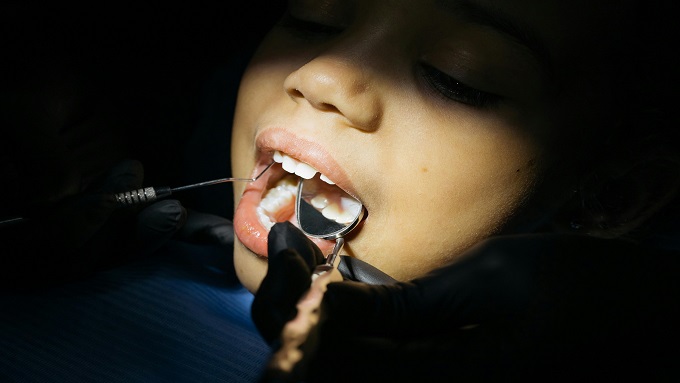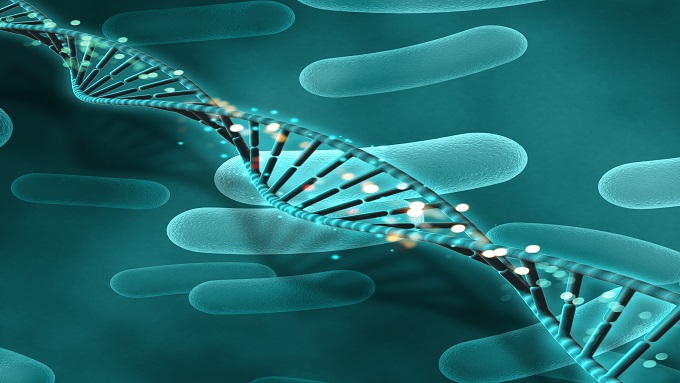CHARACTERISTIC OF CHRONIC MYELOGENOUS LEUKEMIA PATIENTS AT THE POLYCLINIC OF ONCOLOGY, DR. SOETOMO GENERAL ACADEMIC HOSPITAL, SURABAYA, INDONESIA IN 2017
Downloads
Background: Chronic myelogenous leukemia (CML) is a myeloproliferative neoplasm because of the reciprocal translocation of chromosome 22 to chromosome 9. In the United States, the incidence of CML is 1.9 cases per 100,000 people. Whereas in Indonesia, there is no specific national data on CML prevalence, especially regarding the clinical profile, even though the cancer cases reach 1.4 per 1,000 population. Objective: To evaluate the characteristics and clinical features of CML patients in Dr. Soetomo General Academic Hospital, Surabaya, Indonesia. Materials and Methods: This was a cross-sectional descriptive study with data from the medical records of CML patients in 2017 at Dr. Soetomo General Academic Hospital, Surabaya, Indonesia. The sample in this study was CML patients with positive Breakpoint Clusters Region- Abelson (BCR-ABL), having a minimum age of 18 years and equipped with epidemiological data, complete blood count data, and peripheral blood smear data. Results: Thirty-three patients met the study criteria. The sample was predominantly male, with a ratio of 1.06 : 1 to female patients with a median age of 40 years. Spleno-megaly was found in 87.9% of the patients. The average results of leukocyte, platelet, and hemoglobin counts were 254.58 x 103/μL, 557 x 103/μL, and 9.55 g/dL. From the results of peripheral blood smear obtained normochromic normocytic anisopoikilo-cytosis erythrocyte (57.6%), all patients had a profile of increased leukocytes with blast presence in 97% of the patients, and 51.5% had a profile of an increase in platelets and the discovery of giant platelets in 33.3% of the patients. Conclusion: The sample was predominantly male with the highest incidence at a younger age range of 21-30 years. The clinical characteristics showed high leukocytosis with various stage of maturation and a tendency to develop grade 2 normocytic normochromic anemia and thrombo-cytosis was found in the patients.
Atul, B.M. Hoffbrand, A.V., 2014. Haematology at a glance. London: Blackwell Sciences.
Chang, F., Qazi, R.A., Khan, M., Baloch, S., Sahito, M.M., Mir, A., 2015. Clinico hematological profile and phase distribution of chronic myeloid leukemia. Biology and Medicine, 7(5): 5–8.
Chapman, J., Azevedo, A.M., 2019. Splenomegaly. [e-book] Treasure Island: StatPearls Publishing. Downloaded 27 November 2019 from https://www.ncbi.nlm.nih.gov/books/N BK430907
Entasoltan, B., et al., 2017. Outcome of frontline treatment with "generic” Imatinib in adult patients with chronic myeloid leukemia in Algerian Population: A multicenter study. Mediterranean Journal of Hematology and Infectious Diseases, 9(1): 6–11.
Fentie, A.M., Tadesse, F., Engidawork, E., Gebremedhin, A., 2019. Prevalence and determinants of nonadherence to Imatinib in the first 3-months treatment among newly diagnosed Ethiopian's with chronic myeloid leukemia. PLoS ONE, 14(3): 1–12.
Höglund, M., Sandin, F., Simonsson, B., 2015. Epidemiology of chronic myeloid leukaemia: an update. Annals of Hematology, 94(2): 241–247.
Howlander, N., Noone, A.M., Krapcho, M., Miller, D., Brest, A., Yu, M., Ruhl, J., Tatalovich, Z., Cancer Stat Facts: Leukemia ” Chronic Myeloid Leukemia (CML). Downloaded from https://seer.cancer.gov/statfacts/html/cmyl.html
Jabbour, E., Kantarjian, H., 2018. Chronic myeloid leukemia: 2018 update on diagnosis, therapy and monitoring. American Journal of Hematology, 93(3): 442–59.
Kartawan, G., Suega, K., Rena, R., 2016. Karakteristik klinis pasien chronic myeloid leukemia dengan terapi tyrosine kinase inhibitor di Rumah Sakit Umum Pusat Sanglah [Clinical characteristics of chronic myeloid leukemic patients with tyrosine kinase inhibitor therapy in Sanglah Hospital]. E-Jurnal Medika Udayana, 4(9).
Ministry of Health, Repubic of Indonesia, 2013. Riset Kesehatan Dasar 2013 [Basic Health Research 2013]. Jakarta: Kementrian Kesehatan RI.
O'Brien, S., Vose, J., Kantarjian, H., 2011. Management of hematologic malignancies. Cambridge: Cambridge University Press.
Radivoyevitch, T., Jankovic, G.M., Tiu, R.V., Saunthararajah, Y., Jackson, R.C., Hlatky, L.R., Gale, R.P., Sachs, R.K., 2014. Sex differences in the incidence of chronic myeloid leukemia, Radiation and Environmental Biophysics, 53(1): 55–63.
Rahadiyanto, K.., Liana, P., Indriani, B., 2014. Pola gambaran darah tepi pada penderita leukimia di laboratorium klinik RSUP Dr. Mohammad Hoesin Palembang [Peripheral blood profile in leukemic patients at clinical laboratory of Dr. Mohammad Hoesin Hospital, Palembang]. Majalah Kedokteran Sriwijaya, 46(4): 259–65.
Raharjo, B., 2018. Hubungan kadar betha2 mikroglobulin serum terhadap rasio BCR-ABL pada pasien leukemia granulositik kronik (LGK) dengan terapi tyrosin kinase inhibitor [Correlation of serum microglobulin betha2 level on BCR-ABL ration in chronic granulocytic leukemia patients receiving tyrosin kinase inhibitor therapy]. Thesis. Surabaya: Universitas Airlangga.
Reksodiputro, A.H., Syafei, S., Prayogo, N., Karsono, B., Rinaldi, I., Rajabto, W., Mulansari, N.A., 2010. Clinical characteristics and hematologic responses to Imatinib in patients with chronic phase myeloid leukemia (CML) at Cipto Mangunkusumo Hospital. Acta Medica Indonesiana, 42(1): 2–5.
Rendra, M., Yaswir, R., Hanif., A. M., 2013. Gambaran laboratorium leukemia kronik di bagian Penyakit Dalam RSUP Dr. M. Djamil Padang [Chronic leukemia laboratory profile at Internal Medicine Department, M Djamil Hospital, Padang]. Jurnal Kesehatan Andalas, 2(3): 141–5.
Rohrbacher, M. & Hasford, J., 2013. Etiology and epidemiology of chronic myeloid leukemia. In: Wiernik P., Goldman J., Dutcher J., Kyle R. (eds) Neoplastic diseases of the blood, New York: Springer.
Shah, N.P., Arceci, R.J., 2014. Chronic myeloid leukemia. New York: Bristol- Myers Squibb.
Sjoberg, B.P., Menias, C.O., Lubner, M.G., Mellnick, V.M., Pickhardt, P.J., 2018. Splenomegaly: a combined clinical and radiologic approach to the differential diagnosis. Gastroenterology Clinics of North America, 47(3): 643–66.
Sumantri, A. F., Oehadian, A., Wijaya, I., Vidyaniati, P., Rahmaniati, R., 2019. Therapeutic responses of imatinib and nilotinib among CML patients in Hasan Sadikin Hospital Bandung. Indonesian Journal of Cancer, 12(3): 88.
1. The journal allows the author(s) to hold the copyright of the article without restrictions.
2. The journal allows the author(s) to retain publishing rights without restrictions.
3. The legal formal aspect of journal publication accessibility refers to Creative Commons Attribution 4.0 International License (CC-BY).
































